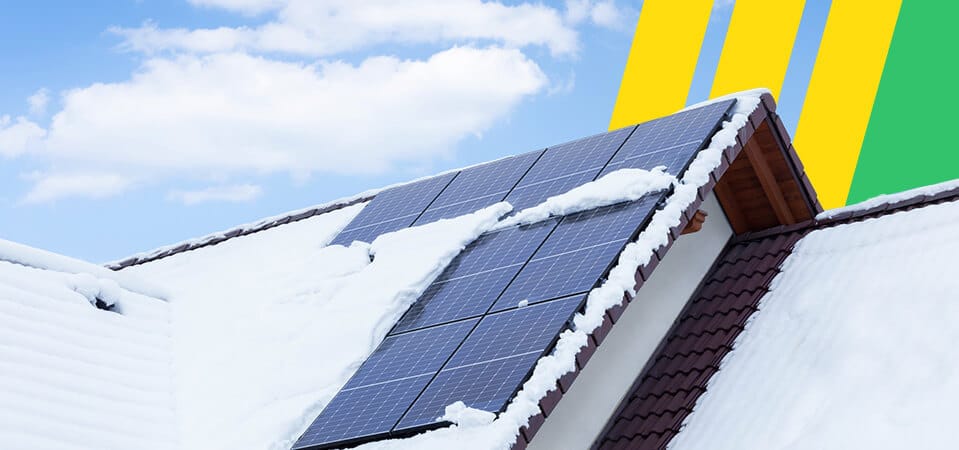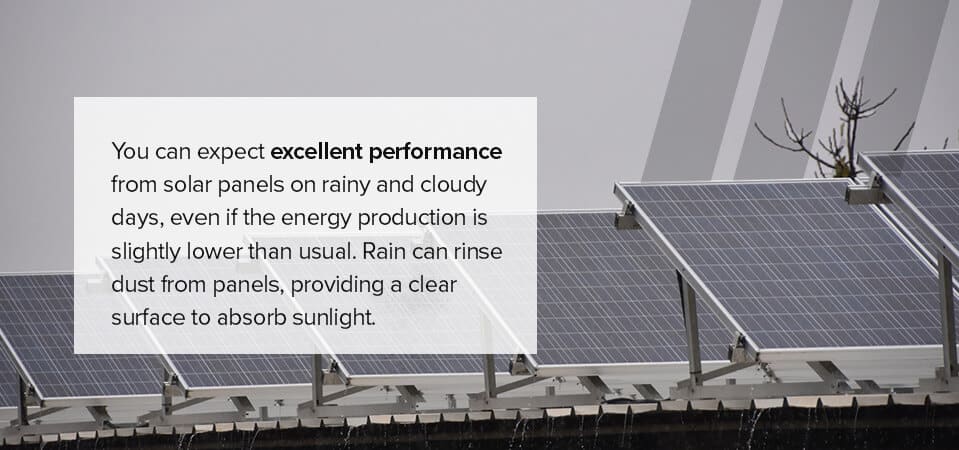
Solar panels can withstand intense weather conditions, providing homes and businesses with power during storms, extreme temperatures and cloudy days. Solar power generation proves dependable in even the most extreme weather.
Solar energy systems deliver top performance on sunny days, but you can also expect excellent energy output during inclement weather. Investing in high-quality solar panels and trusting a professional installation company with your system helps ensure your system remains intact and effective in any storm.
Weather has minimal effect on high-quality, properly-installed solar panels. Solar energy systems are designed and manufactured to withstand severe weather conditions, allowing them to deliver reliable power during rain, clouds, strong winds, lightning, snow and hail.
You can enjoy reliable solar power anywhere because solar energy systems operate effectively in all climates. While solar energy systems thrive on North Carolina’s sunny days, they also operate effectively on cold, snowy days and during the strongest storms.
Weather can affect the amount of sunlight that reaches solar panels and the amount of energy they produce, but solar energy systems are highly resilient in inclement weather. Solar panels can continue delivering power in the following conditions.
Solar panels function normally in cold weather. Because they convert energy from sunlight and not heat, they effectively absorb energy from the sun whether the outdoor temperature is hot or cold. Solar panels generate energy as long as sun rays are touching them, so you can depend on a solar panel to produce electricity even when North Carolina’s temperatures drop.
Solar energy systems also operate effectively on extremely hot days. Solar panels absorb the most light energy on sunny days, and they can withstand high temperatures.
Solar panels are waterproof, so they remain operational during rainfall. Protective covers prevent moisture from reaching a solar energy system’s inner electrical components.

You can expect excellent performance from solar panels on rainy and cloudy days, even if the energy production is slightly lower than usual. Rain can rinse dust from panels, providing a clear surface to absorb sunlight. Additionally, the sun’s rays can still reach your panels when it rains.
Direct sunlight delivers the most energy to solar panels, but a solar energy system can still produce electricity on rainy days. Sunlight can travel through rain and clouds to reach panels, delivering indirect sunlight. Rain and clouds diffuse light, scattering the light particles in different directions. While direct sunlight delivers more light particles to panels at a faster rate, indirect sunlight can still reach your panels.
Your home or business may receive less energy on cloudy days than it does on clear, sunny days, but you can still rely on it for sufficient energy. The amount of sunlight your panels receive and the energy they produce depends on cloud density.
Solar panels also operate effectively when it snows. Snow melts rapidly on a panel’s dark surface, and it slides off of the tilted, smooth glass easily. Light snow layers typically disappear quickly with the help of wind.
Similar to rain and clouds, snow may reduce the amount of sunlight that reaches your panels but still allows sufficient light energy to pass through. If a significant amount of snow accumulates on your solar panels, you can remove it using a solar panel snow rake to improve energy production. Solar panels have a weight limit that you should consider if you experience heavy snow, but North Carolina’s mild snowfall typically remains below a solar panel’s weight limit.
In some instances, snow can also increase a solar panel’s energy production. Albedo indicates how much sunlight a surface reflects compared to the total amount of light the sun emits, and snow has a high albedo. Snow reflects sunlight, so a snow-covered lawn can reflect the sun’s rays to your solar panels and generate additional electricity.
Solar energy systems are more likely to remain unaffected during heavy wind and storms than traditional power systems. Strong wind gusts can quickly damage power lines, leaving homes depending on them without electricity. Households with solar panels can expect consistent power even during heavy storms. Quality solar panel systems are designed to withstand high wind speeds.
Significantly strong winds and tornadoes can potentially travel under a solar panel to pull the panel off of a roof or the ground, but this rarely occurs. Proper installation keeps solar panels secure, so hiring a reputable installation company can help prevent wind damage to your system.
Solar panel hail damage is possible but unlikely. Solar panels have glass covers durable enough to withstand hail impact. A cover may crack if several hailstones strike a solar panel in the same spot simultaneously, but this is rare. You can rely on durable covers to protect your solar panels’ internal system components during hail storms.
While direct lightning strikes are rare, they are possible and can potentially affect solar panels. Indirect lightning strikes can cause high-voltage surges, but properly-installed panels contain protective elements to prevent damage.
High-quality solar energy systems can withstand intense weather conditions. From sunny days to heavy storms, you can depend on solar panels to give your home or business sufficient power. Investing in quality solar panels and professional installation protects your solar energy system from damage, ensuring you have electricity when you need it.
8MSolar’s in-house engineering staff has the knowledge and experience to install solar systems properly, and we use only the best hardware for each application. When it comes to solar panels and weather, the 8MSolar team is dedicated to ensuring households and businesses can depend on their systems in all conditions.
The 8MSolar team is a leader in the solar energy industry, and we have been installing solar panels for residential, commercial and nonprofit properties since 2015. Contact us to learn more about our premium solar panels and request a quote.
This content was originally published here.
